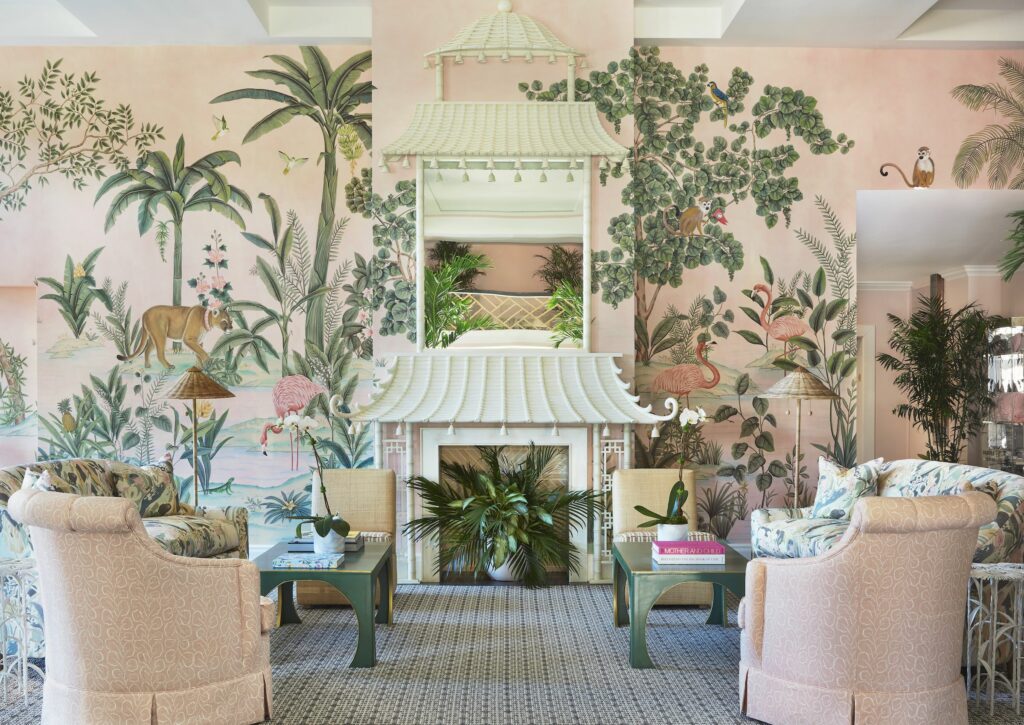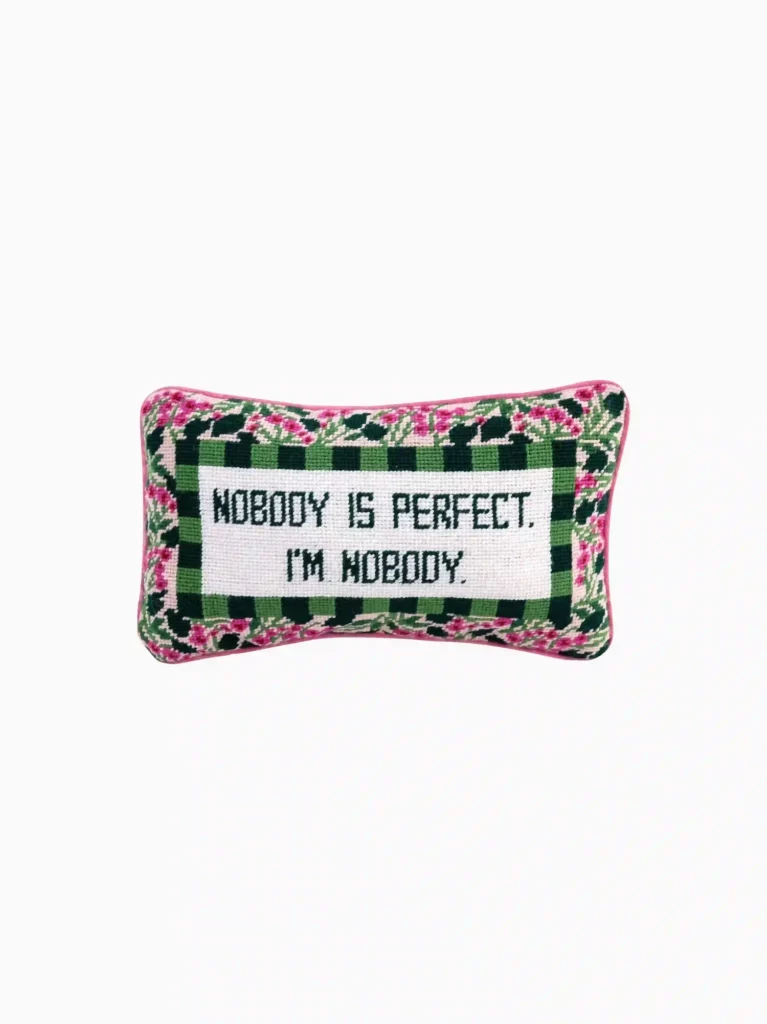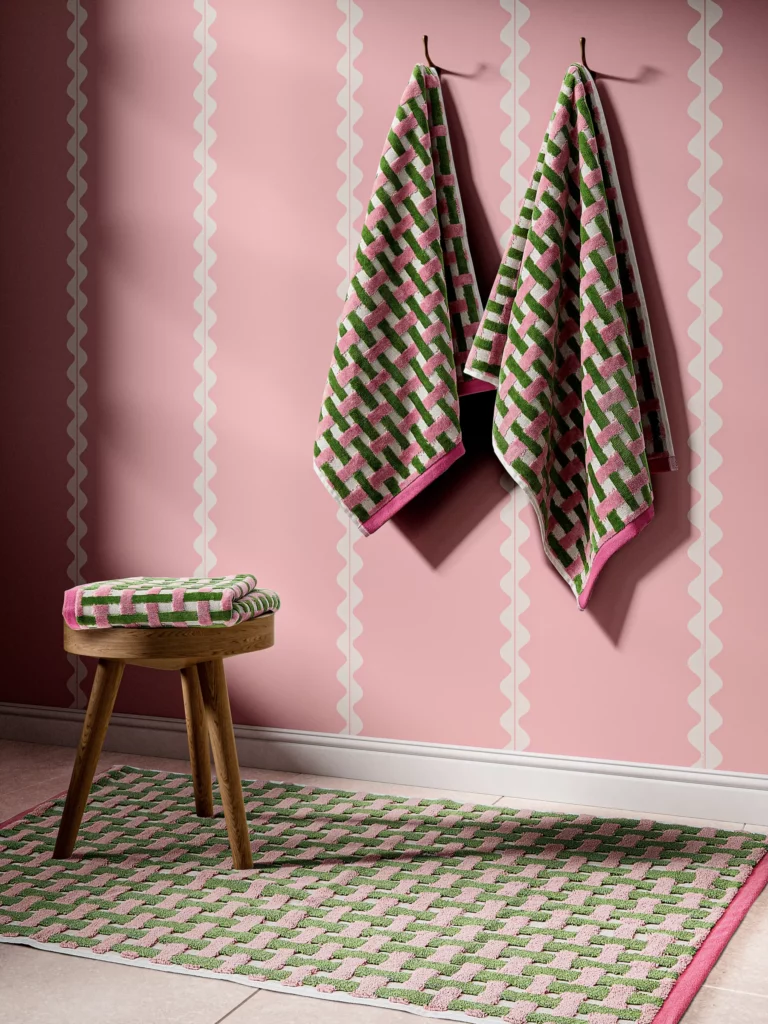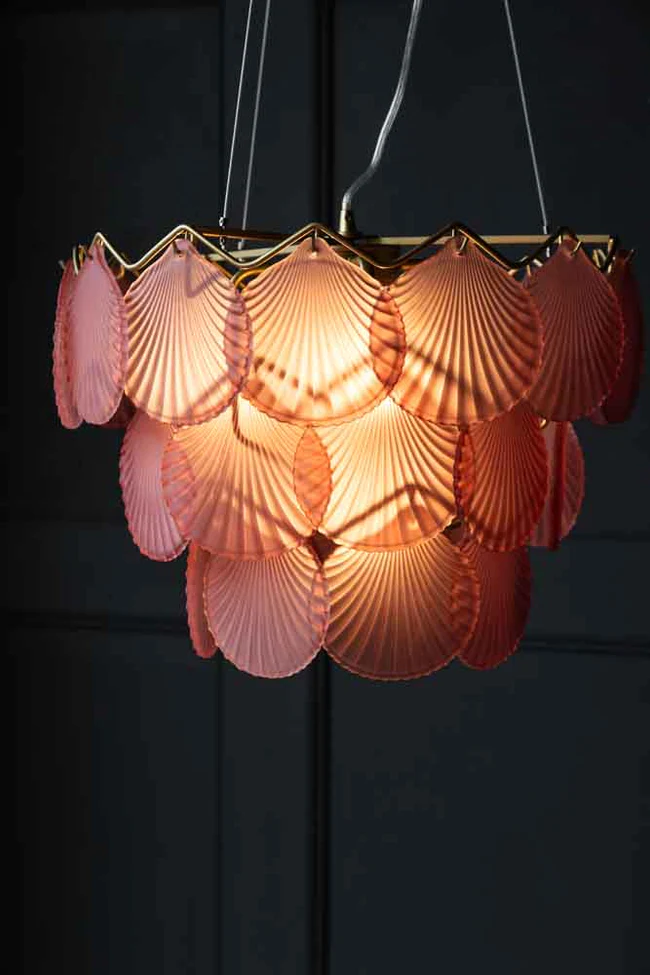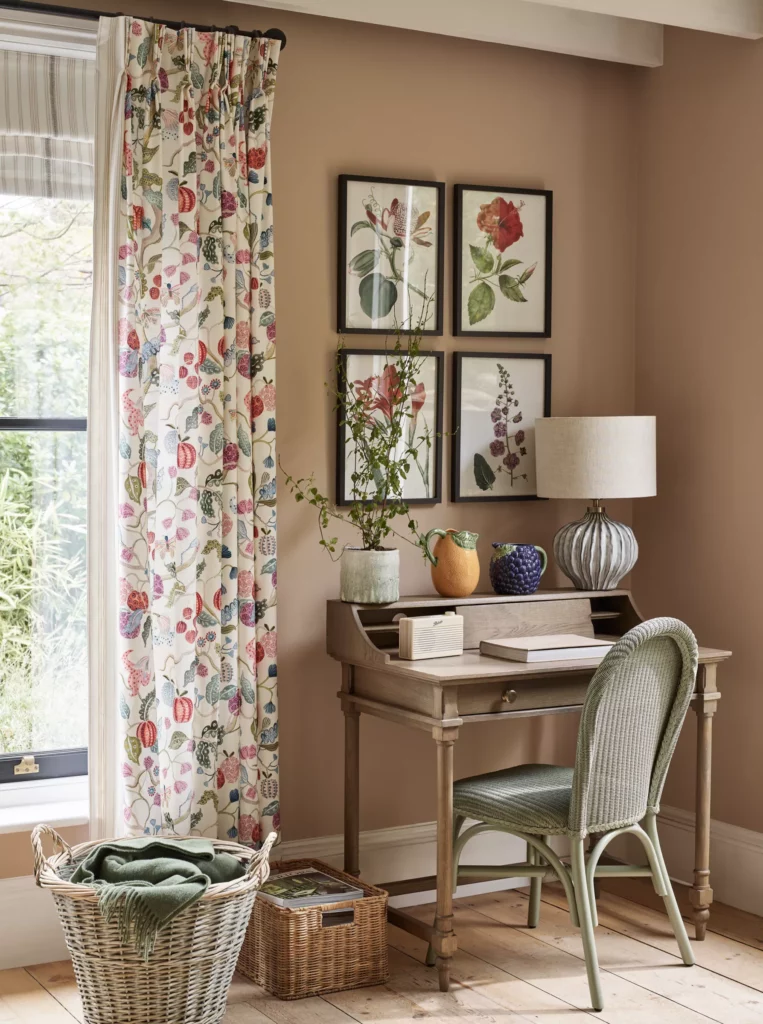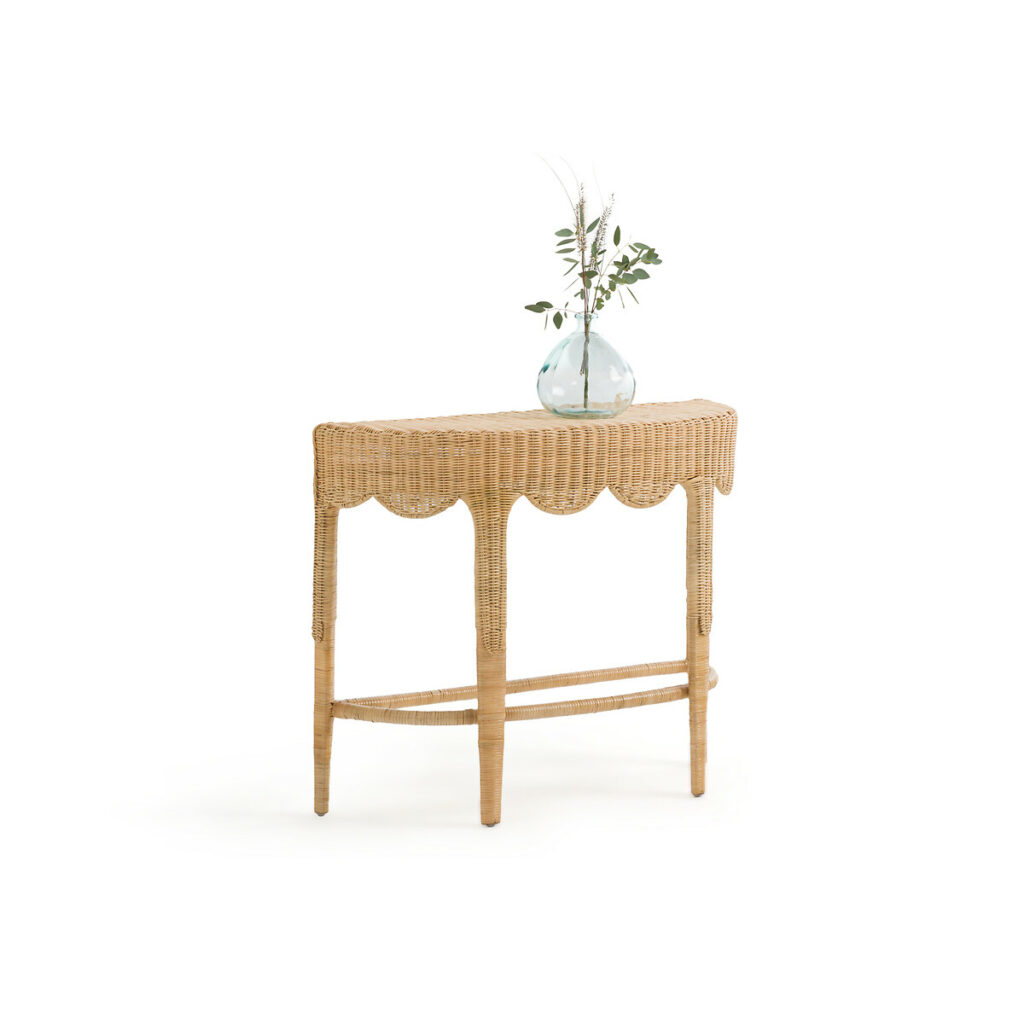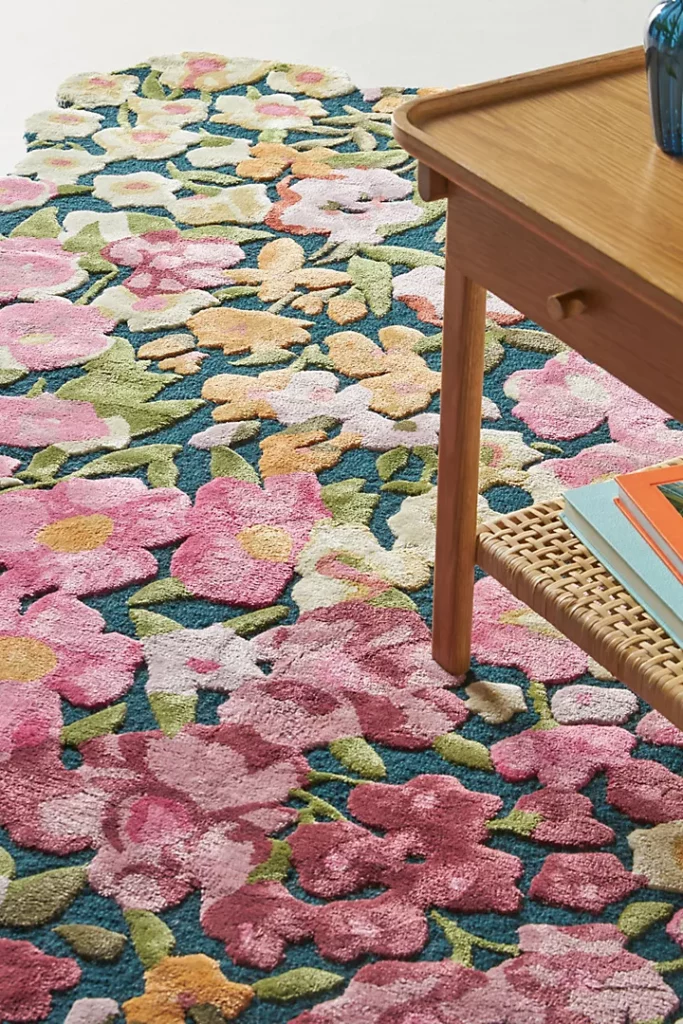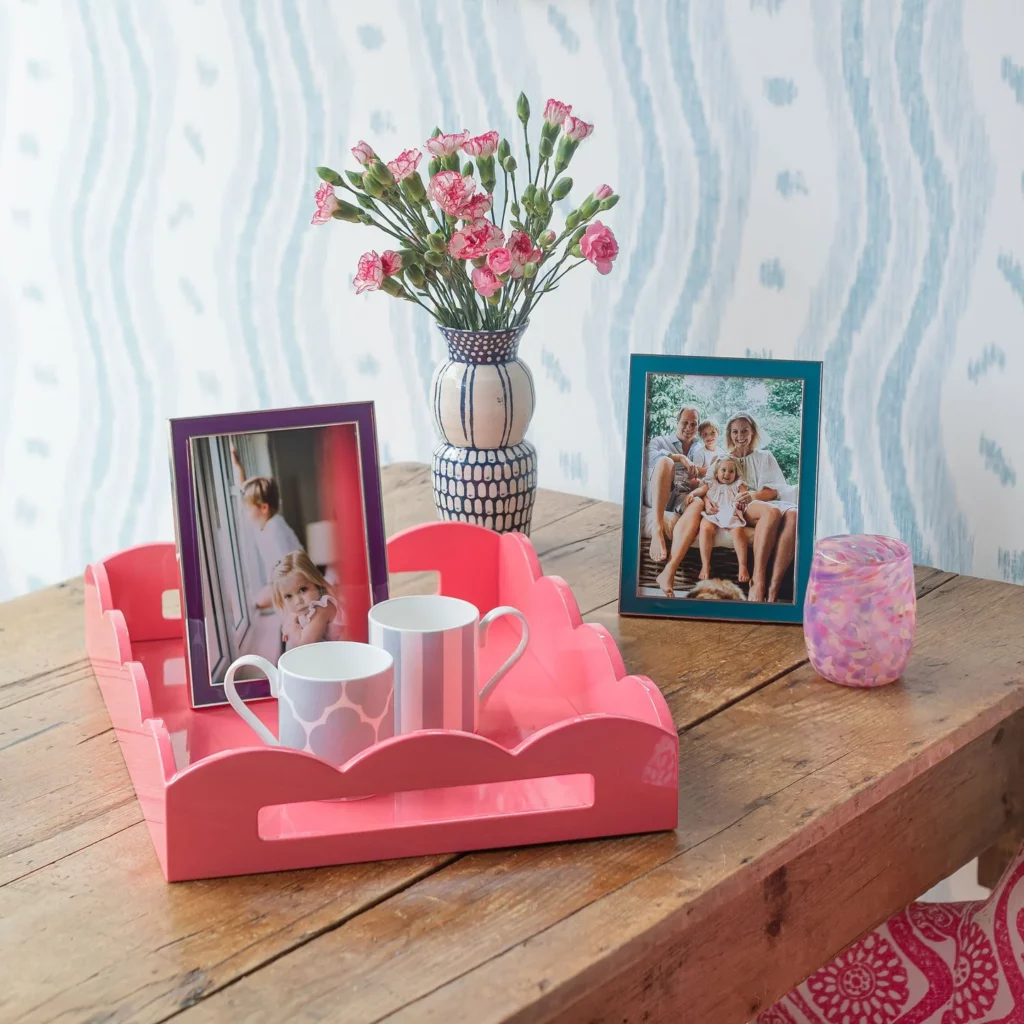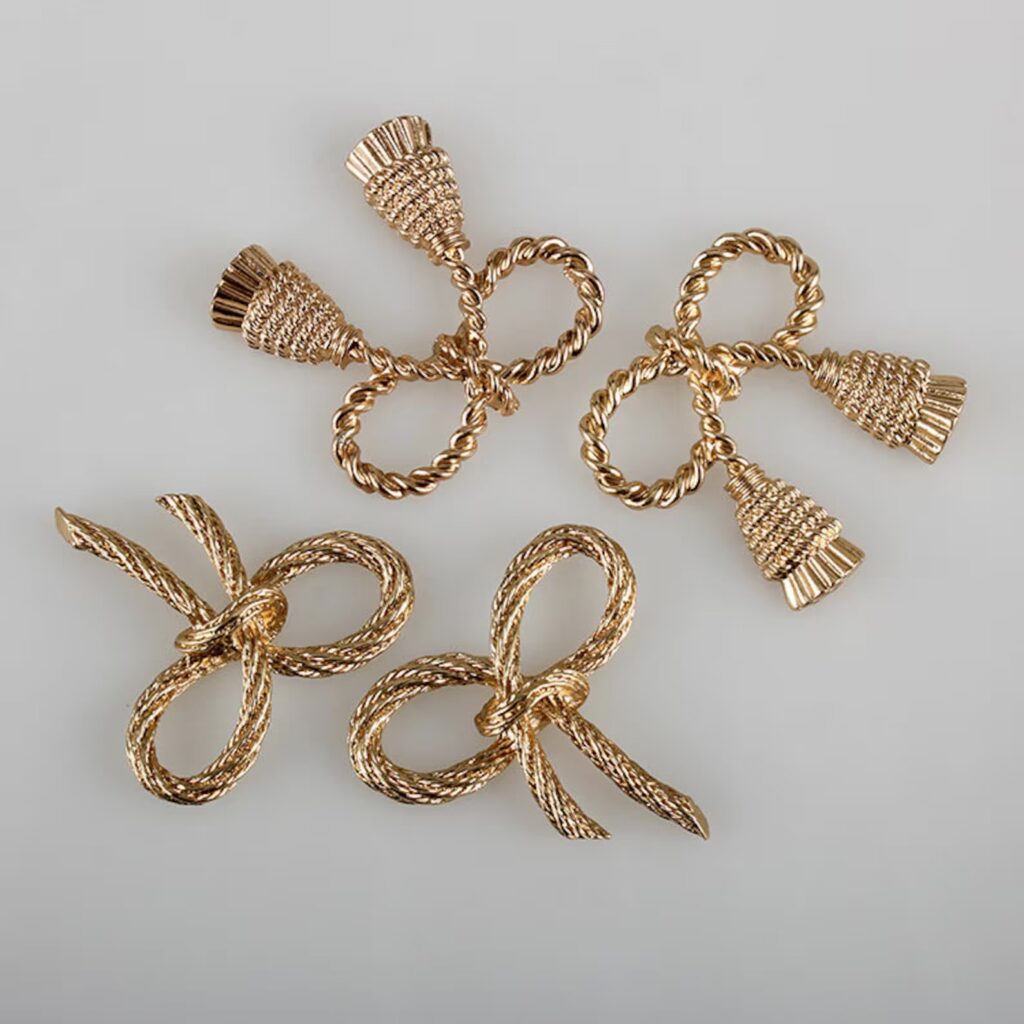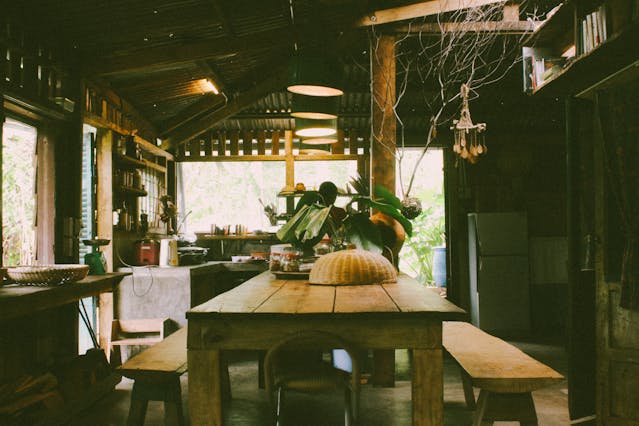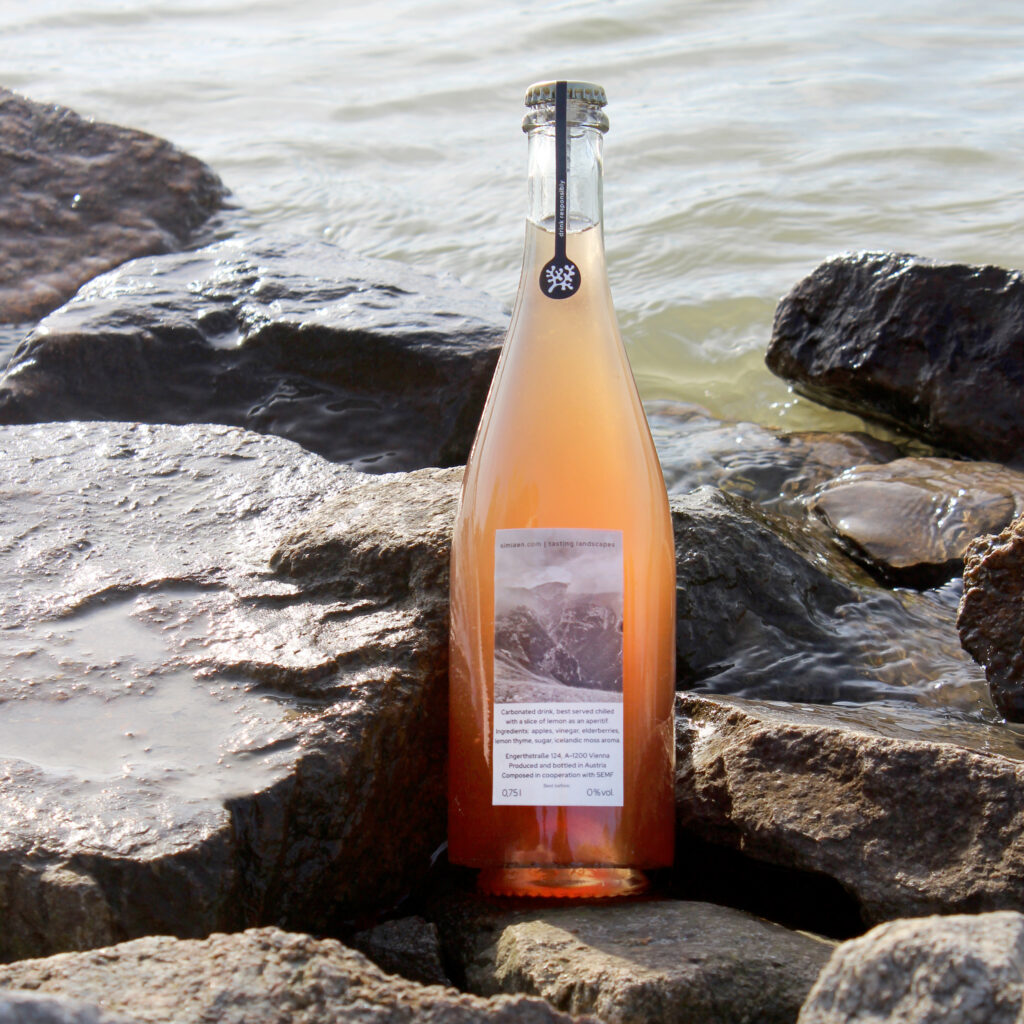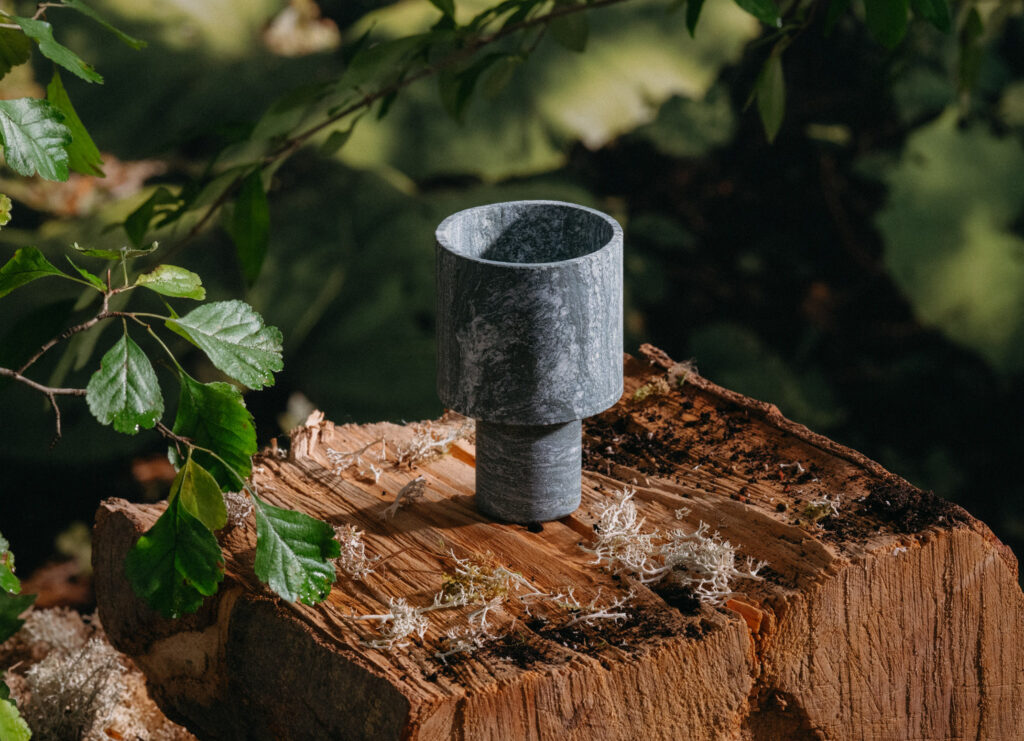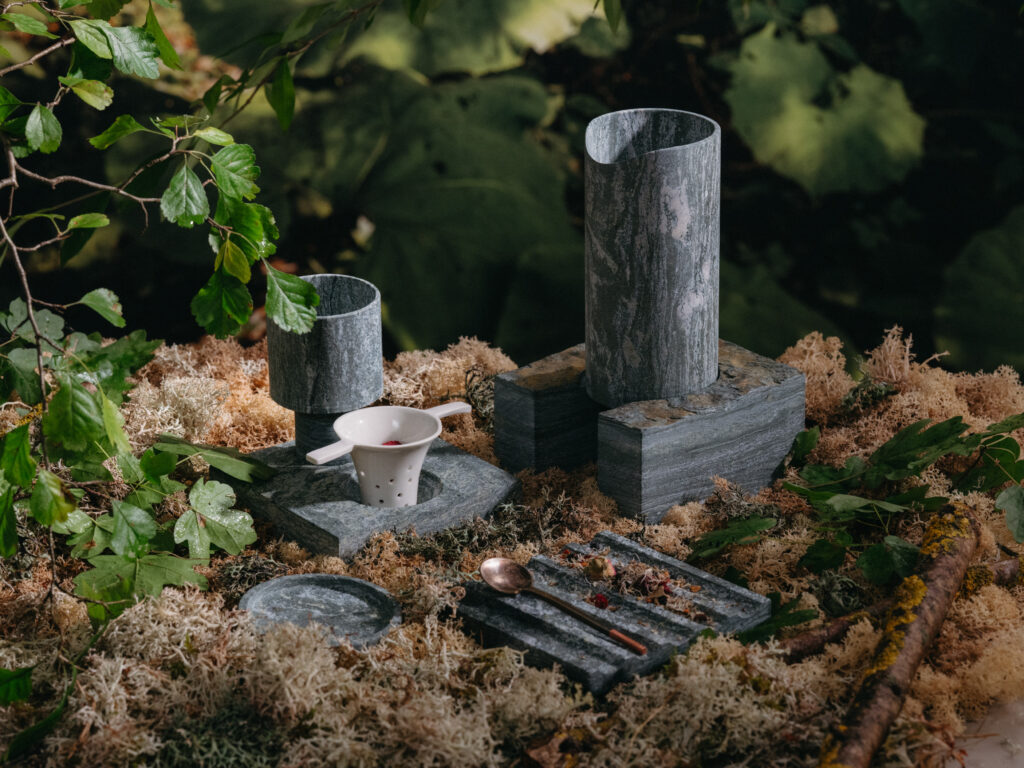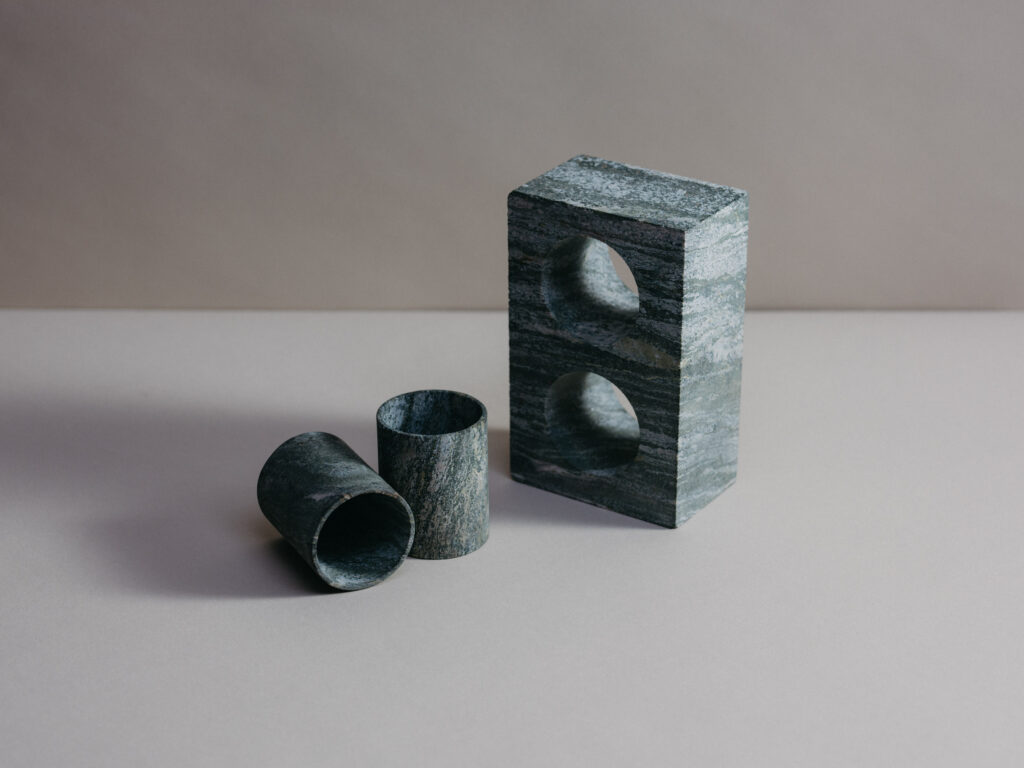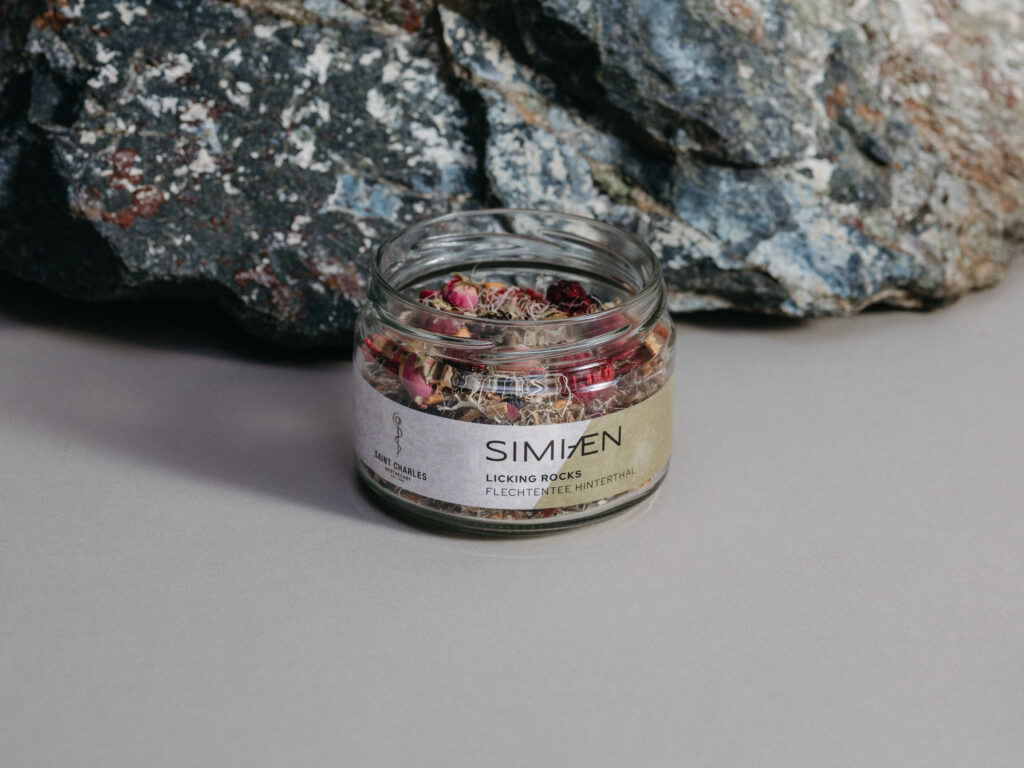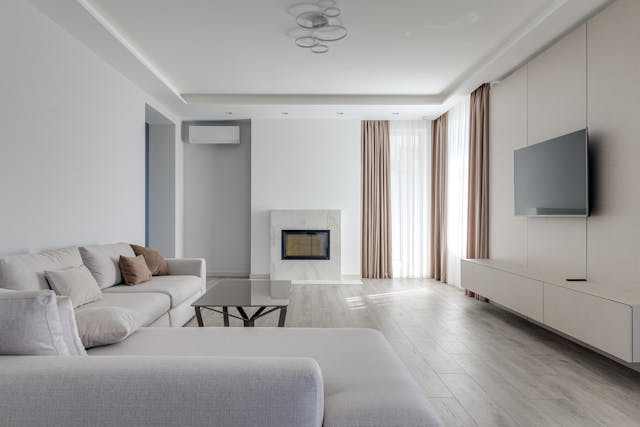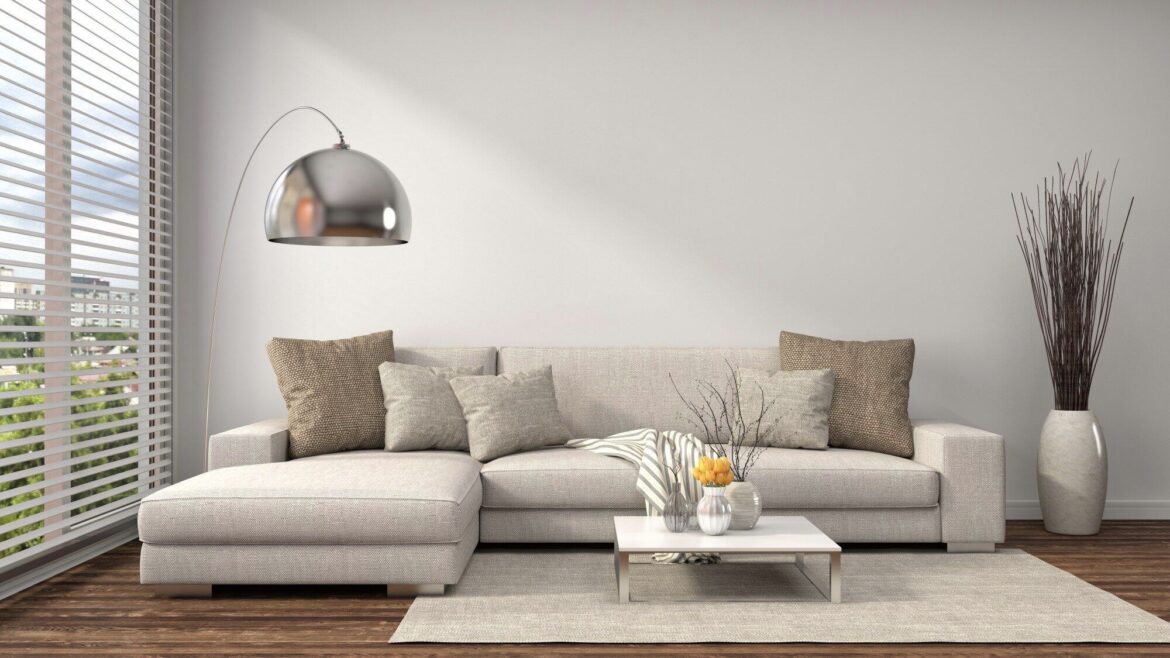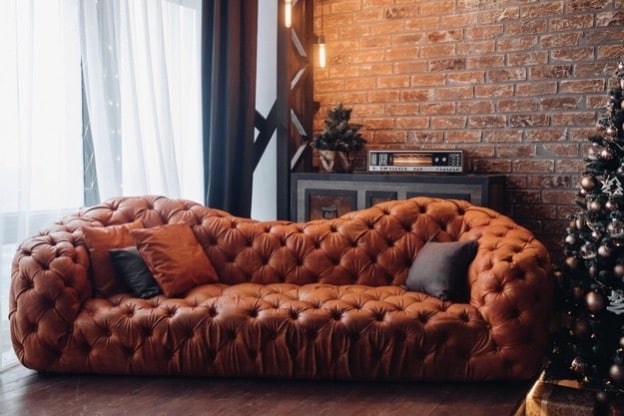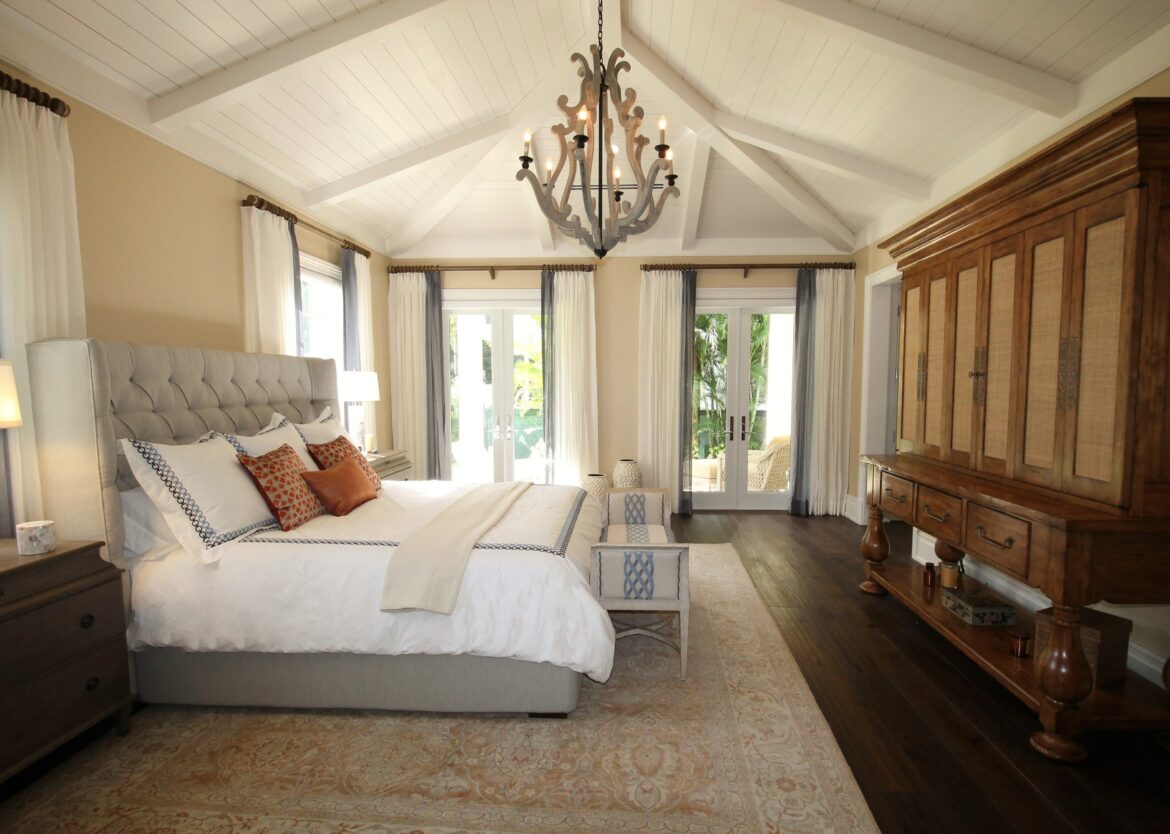Discover Palm Beach through the eyes of our interior designer and stylist Siobhan Murphy. From the iconic interiors of The Colony Hotel to the vibrant thrift stores and art deco architecture, Siobhan shares her love for all things pink, glamorous and joyful in Palm Beach.
Join her as she eats at the best restaurants, visits the top shops and indulges in the unique experiences this coastal paradise has to offer…
Example Itinerary for five days in palm beach :
Day 1:
- Leisurely brunch at Swifty’s poolside at The Colony hotel.
- Explore Worth Avenue with a trip to institutions such as Giorgio’s and Lilly Pulitzer a must!
- Dinner at Stage, a small-plates experience, inspired by diverse culinary influences from across the world.
Day 2:
- Brunch poolside at Honeybelle restaurant at the PGA National Hotel, don’t forget to try their famous fried chicken.
- Picnic boat tour and cruise with Palm Yacht’s.
- A trip to the famous Antique Row for an abundance of interior treasure
- Dinner at the 1950’s inspired Nicks Diner
Day 3:
- Breakfast at locals favourite Loic French bakery
- Spend the day thrifting for vintage interior decor at various thrift stores like Goodwill Habitat Restore and House of Hope
- Poolside bingo and dinner at The Colony Hotel
Day 4:
- Visit the Boca Ratan campus to see brutalist art deco by world famous designer Marcel Breuer
- Stop by The Wenger House to see this art deco futuristic looking house.
- Dinner at the hottest new haunt in town Pink Steak for lots of Miami style decor and an abundance of flamingo’s! Great steak too.
Day 5:
- Visit designer fabric and interiors shops like Serena and Lily, Kemble Interiors and Lori Jane for some amazing interior inspiration
- Massage and treatments at the PGA Spa to relax and unwind in tranquil surroundings
- The iconic Breakers for sunset cocktails and dinner at the seafood bar, the Bloody Mary comes with a perfect prawn on top, utterly delicious!
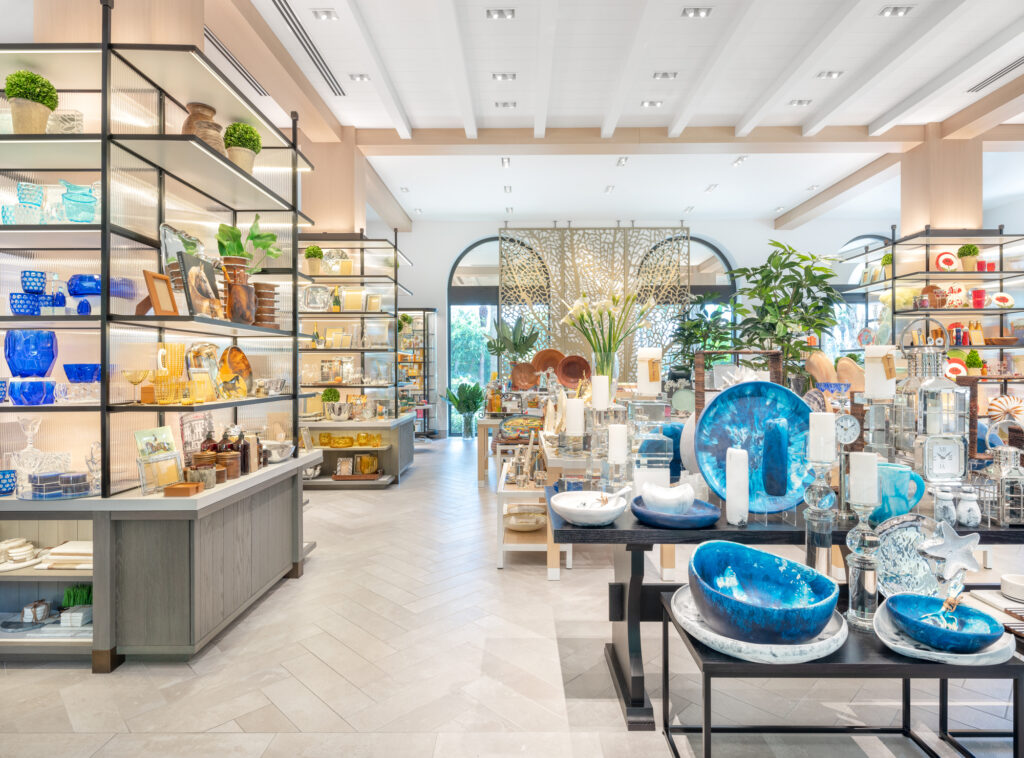

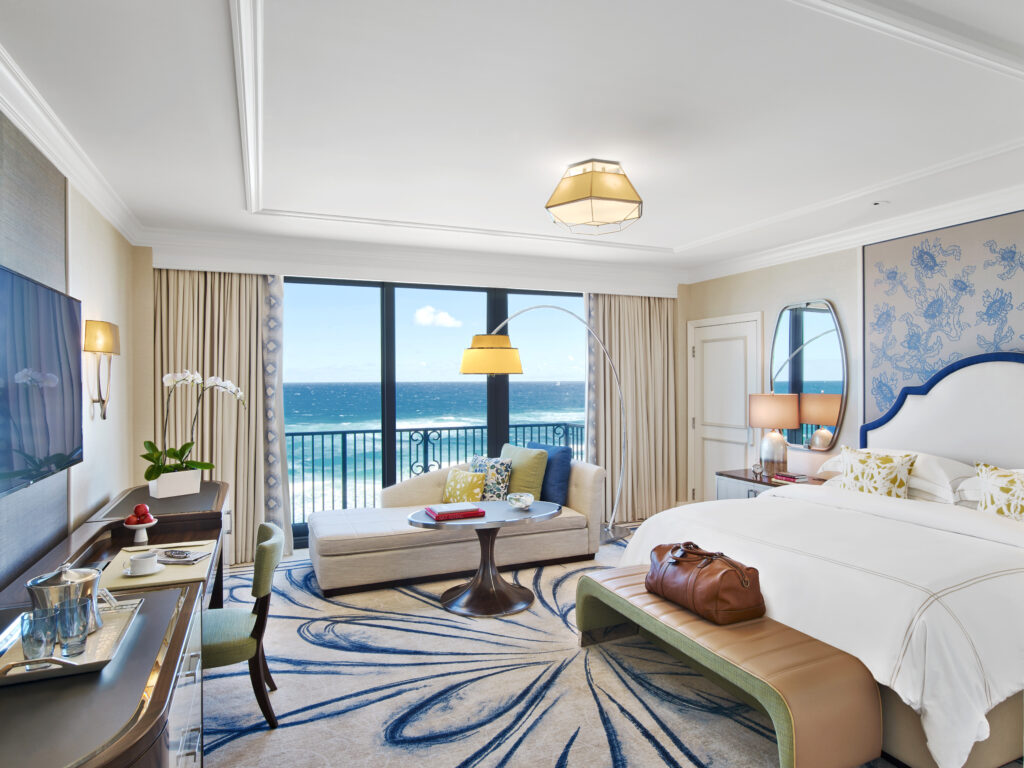
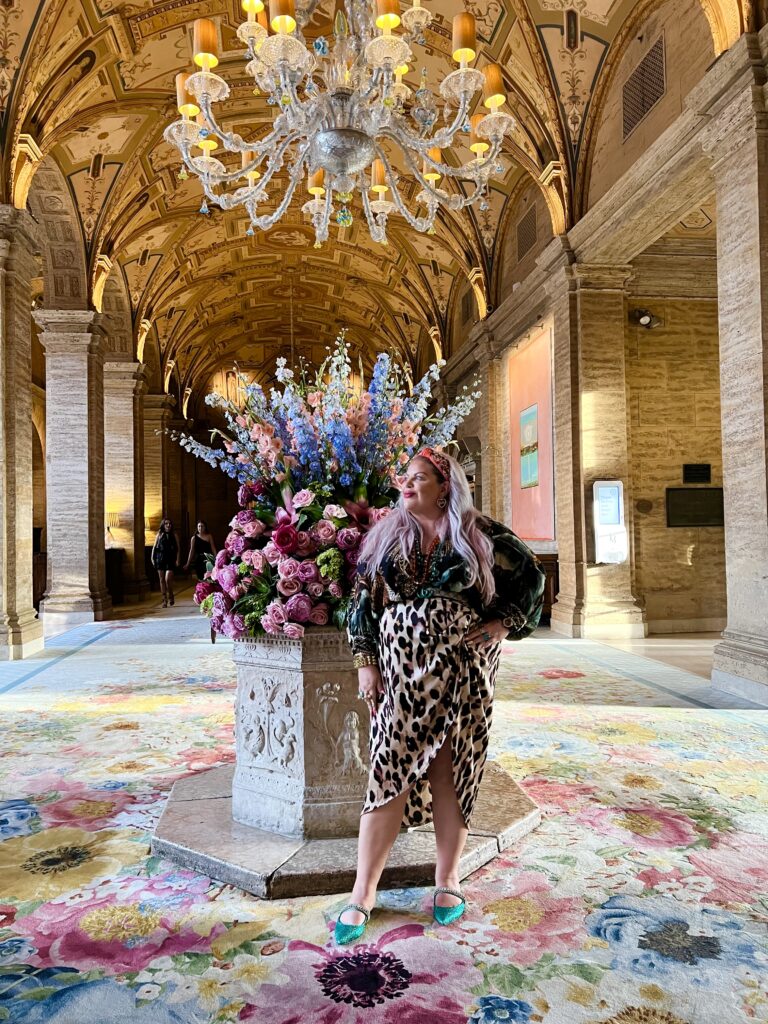
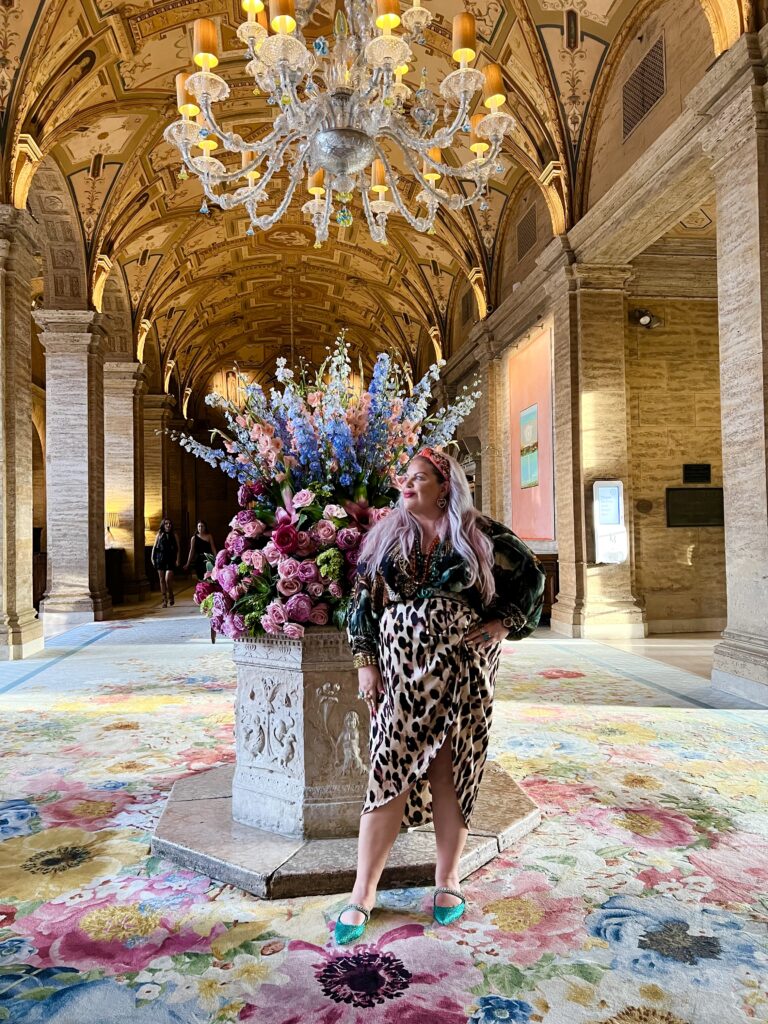
About the Palm Beaches
The Palm Beaches, is a collection of 39 vibrant cities and towns that make up Palm Beach County, it’s a thriving destination of culture and spectacular natural beauty. Built on 125 years of genuine hospitality and 47 miles of palm-tree-lined golden beachfront that’s just waiting to be explored. Known as America’s First Resort Destination, The Palm Beaches was originally established for discerning leisure travellers in the late 1890s and today offers a vast array of luxury hotels, gorgeous boutiques and design led restaurants and bars.
Getting there
I flew to Miami from Manchester via Atlanta and spent a few days in Miami Beach before taking an Uber up to the Palm Beaches, which only took an hour and cost less than $100. This means that even if you are in Miami for a few days you could easily visit Palm Beach for the day. There are also 18 daily trains from Miami to West Palm Beach making it easily accessible.
PGA National hotel
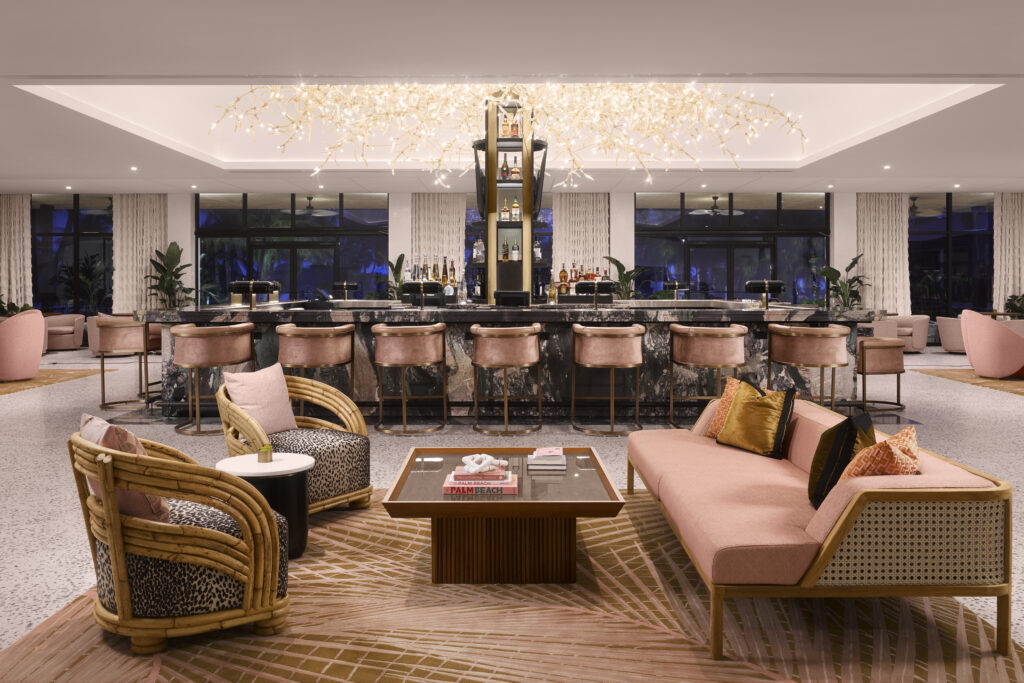
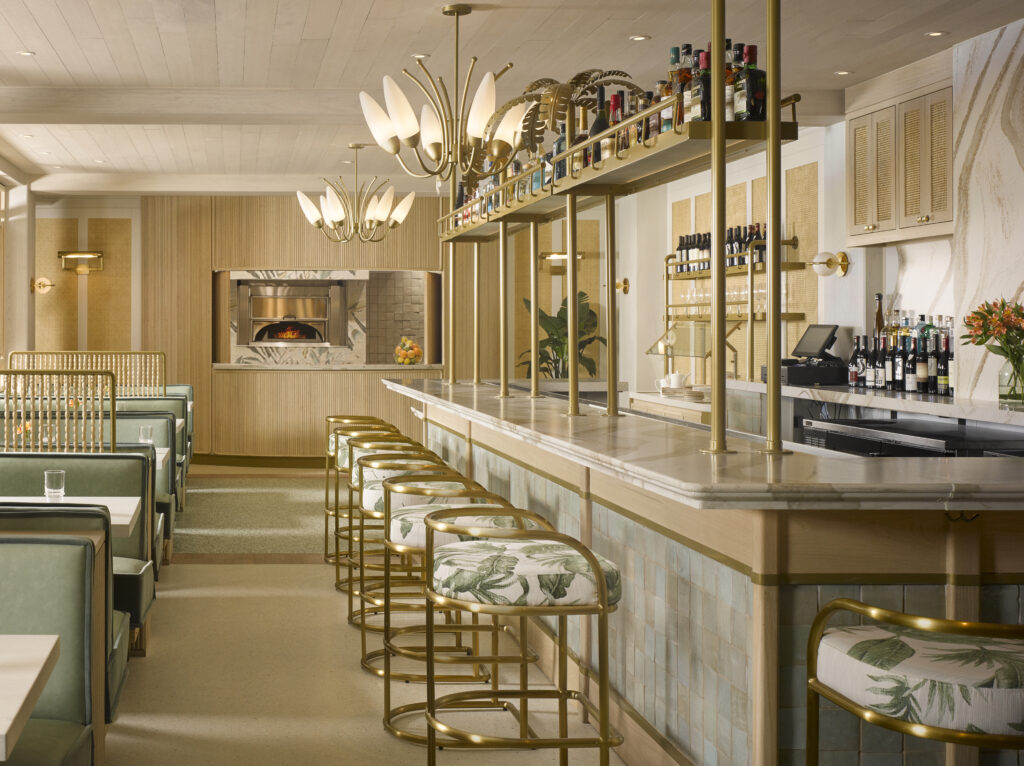
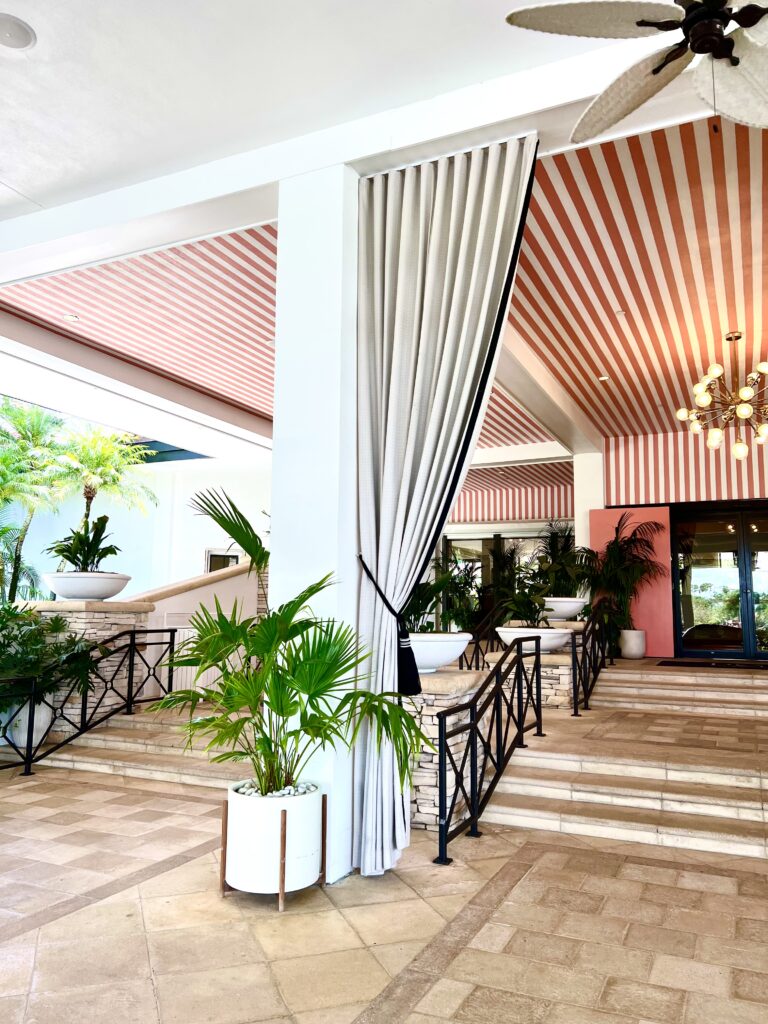
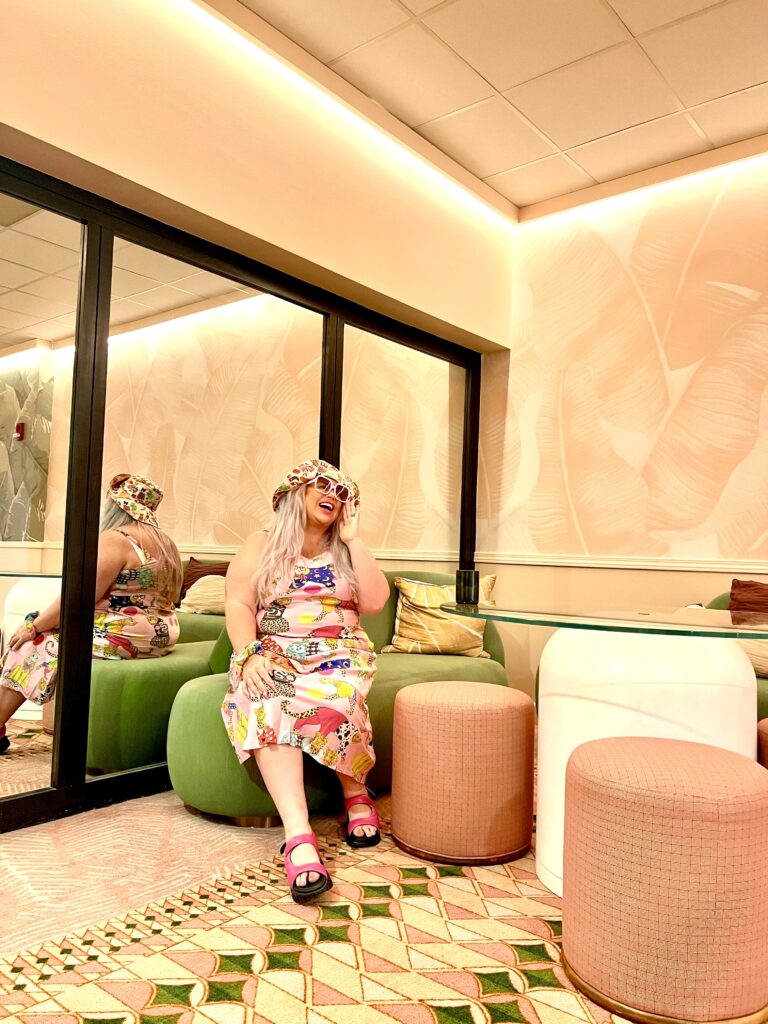



Arriving at the PGA National Resort, I couldn’t help but be wowed by the pink and white striped ceiling, fancy chandeliers, and a whole army of palm trees. It felt like I was stepping into a glamorous oasis right from the get-go. My home for the next few days was one of their junior suites, and let me tell you, it was luxury on another level – think soft lighting, rattan beds, banana leaf murals, and pink velvet sofas that practically begged you to dive in after a hard day of shopping.
Aside from the obvious golf scene, the hotel had its own little world of deliciousness. Honeybelle restaurant was my go-to recommendation. The Palm Beach vibes in its green and pink pastel decor paired perfectly with their pretty cocktails and I chowed down on the house speciality – the most delicious fried chicken I’ve ever tasted.
Thrift Shopping
Palm Beach has been a dream on my bucket list ever since I started following this fabulous lady on Instagram called @palmbeachthrifters She’d share these daily gems about thrifted wonders, vintage decor, and fashion that made me say, “I need to go there.” Armed with a list I’d carefully compiled from her posts, I embarked on a thrifting adventure.
Picture this: 12 stores, some a casual stroll away, others requiring a short Uber ride and a day of pleasing myself whilst treasure seeking.
Top tip: Next time I will definitely hire a car for a more convenient shopping days and just having the freedom of getting in the car to explore this wonderful area.
Now, the poolside situation was nothing short of a party for one with a side order of relaxation. I splurged on a black and white striped cabana for the day – sun loungers, towels, and a fridge stocked with drinks; talk about a recipe for the perfect day, I was in my element. As this was my very first solo trip abroad I was keen to do everything I wanted, on my own time and because treating yourself is a must, I ventured into the beautiful on-site spa for an afternoon of pampering and massages on one of those rainy afternoons. PGA National, you’ve got the whole package.
Here are my thrifting top spots for antique decor and cool vintage clothing:
- Goodwill North Lake & Broadway
- Habitat ReStore
- Hospice Resale
- Our Sisters Place
- Furry Friends Thrift
- House of Hope
- American Thrift
- Quantum House
And wow, did Palm Beach deliver on the thrifting jackpot! From dreamy ceramics and rattan furniture to coloured glassware and vintage linens, it was a treasure trove. I snagged cushion covers, floral plates, earrings, tablecloths, serve-ware, silk shirts, and an assortment of trinkets – mostly from the ‘70s and ’80s. The only downside? My thrift haul set me back an extra $100 in excess baggage fees. But it’s not a real holiday without a bit of splurging, right?
Antique Row
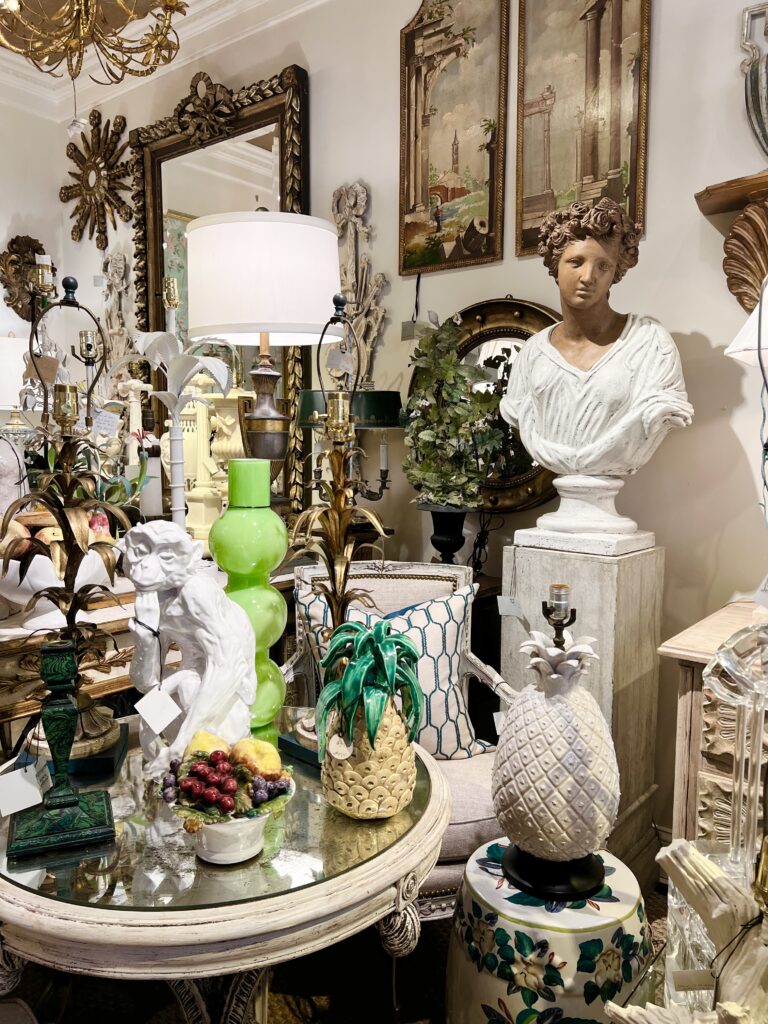
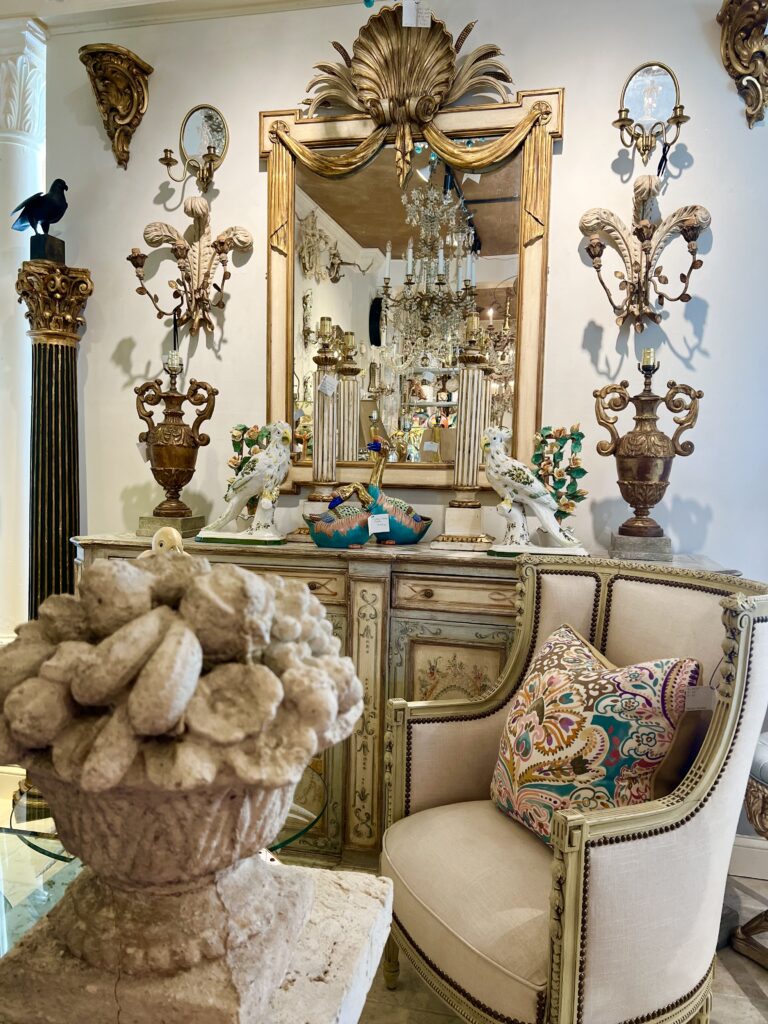
Antique Row is a treasure trove for those seeking exquisite interior decor and even if you are not in the market to buy, it’s great to see such an eclectic mix all in one place. This charming district boasts a collection of premier antique shops and galleries, with each one offering a unique blend of timeless pieces. As you stroll through the row, you’ll encounter a rich tapestry of vintage furniture, elegant art, and rare collectibles. Whether you’re an avid collector or simply appreciate the beauty of well-preserved history, Antique Row beckons with the promise of discovering one-of-a-kind pieces that can effortlessly elevate your home’s aesthetic. For those with an eye for sophistication and a penchant for the unique, Antique Row in Palm Beach is a haven waiting to be explored.
My favourites shop was James and Jeffrey Antiques it was so beautifully curated, and the staff were so friendly too, it was nice just to stop and chat about our mutual love of maximalism.
Worth Avenue

Of course no trip to palm beach would be complete without a wander down world famous Worth Avenue, it beckons travellers with its old school charm and designer allure. It’s so pristine it almost feels like a movie set. Renowned as one of America’s most iconic shopping streets, this palm-lined avenue boasts an array of luxury boutiques, art galleries, and exquisite dining options.
I just adore the Mediterranean-inspired architecture it adds a touch of old-world elegance, creating a sophisticated atmosphere that combines history and opulence. Strolling along Worth Avenue is a sensory experience, where high-end fashion mingles with the tropical breeze, And of course It’s safe to say this palm-fringed paradise is a must visit destination for those seeking a refined and indulgent escape.
Chanel, Gucci, Ferragamo, Valentino, and Saks fifth Avenue are just a few of the designer names you can shop here along with some beautiful independent luxury boutiques.
The Gardens shopping Mall
The Gardens Mall in Palm Beach Gardens. This expansive shopping centre features a mix of high-end retailers, dining options, and upscale boutiques set amidst a sophisticated ambiance.
The Gardens Mall in Palm Beach Gardens, Florida, is a luxurious 1.4 million square foot shopping centre featuring over 150 fine speciality shops, anchored by famous department stores such as Nordstrom, Saks, Bloomingdale’s and Macy’s.
Since it opened in 1988, The Gardens Mall has maintained its position as a world-class shopping destination. The blending of award-winning architecture art and shopping makes The Gardens Mall the premier shopping destination in Palm Beach County. I managed to purchase the most incredible and colourful Pucci silk shirt, and each time I wear it I am transported back to this wonderful place.
Loic Bakery Cafe Bar
This charming French bakery and cafe is a hidden gem frequented by locals. The best part about this menu is that you can order breakfast anytime. They serve the best croissants in West Palm Beach — and offer over five different varieties. I was particularly fond of the white chocolate pistachio croissant, a great way to start the day.
The Colony Hotel

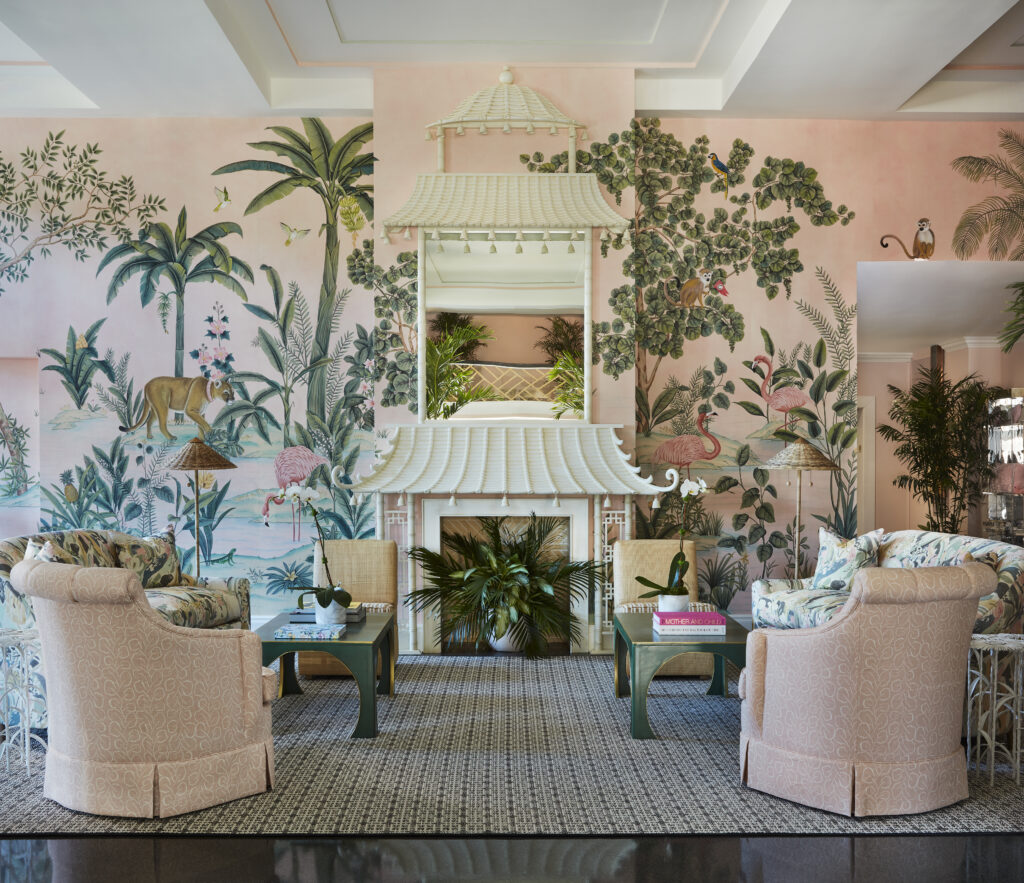
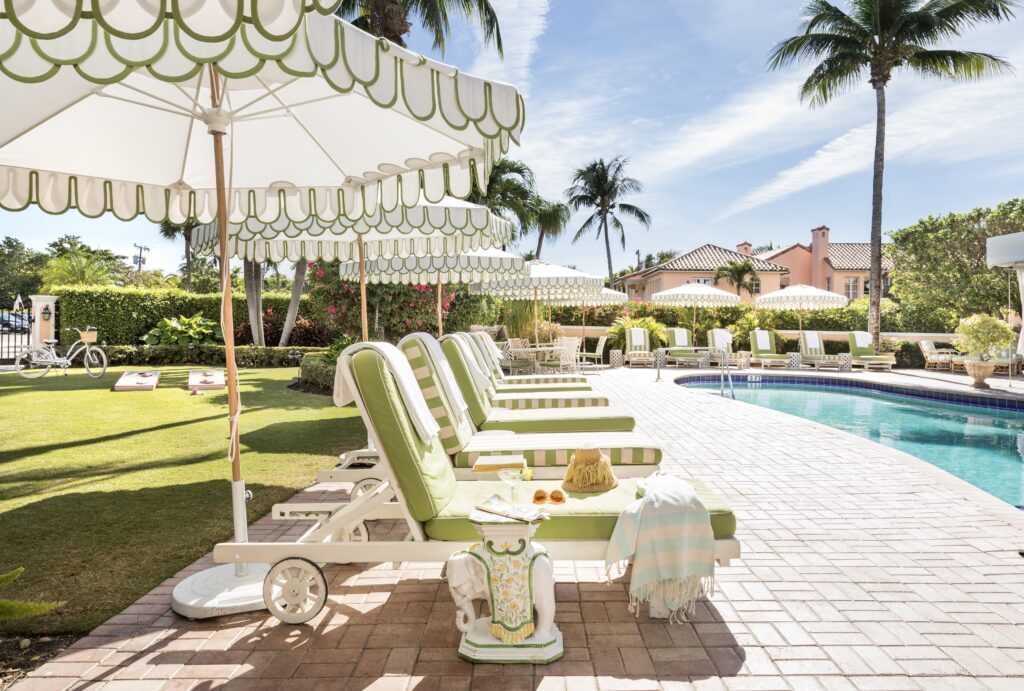
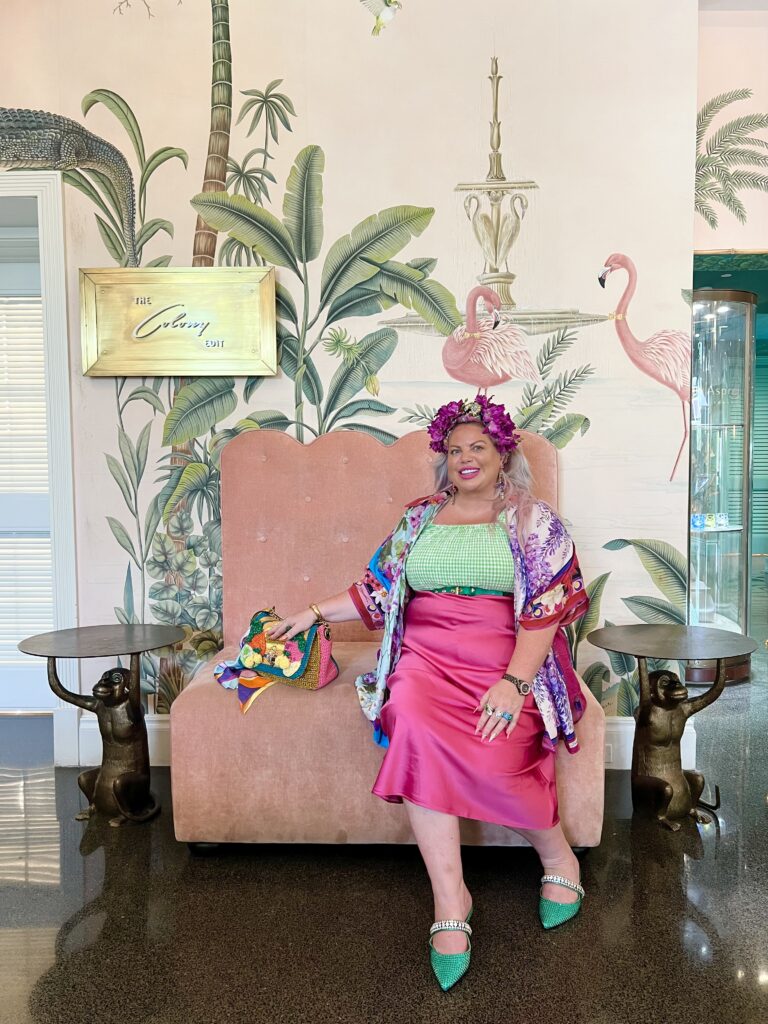
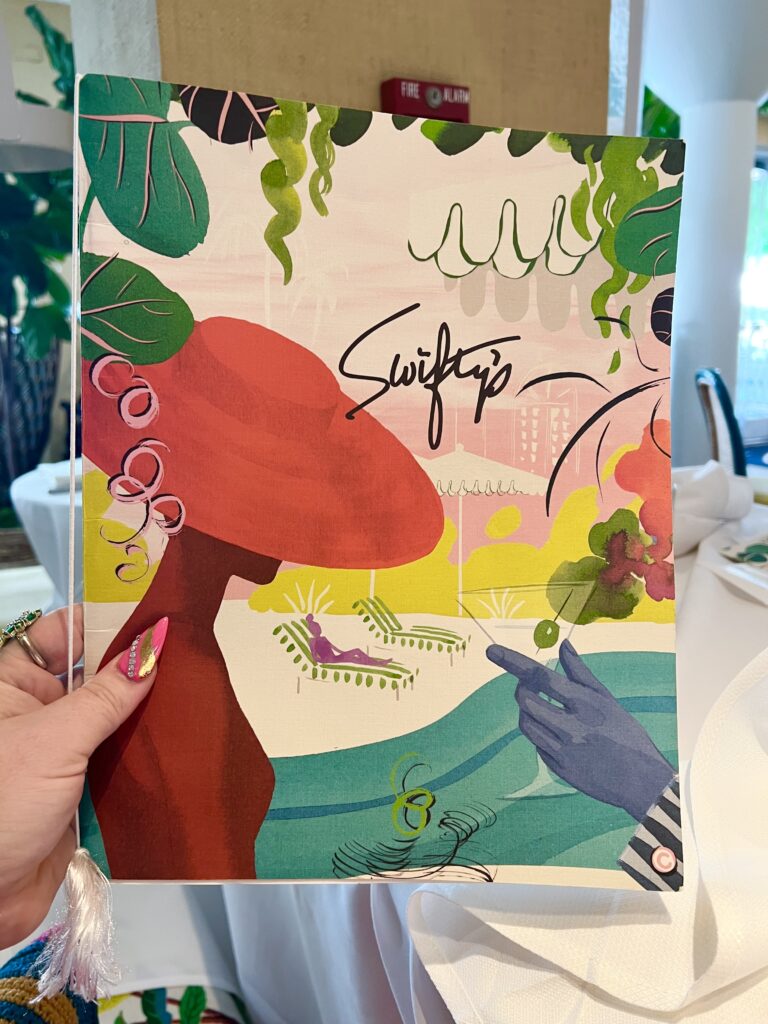
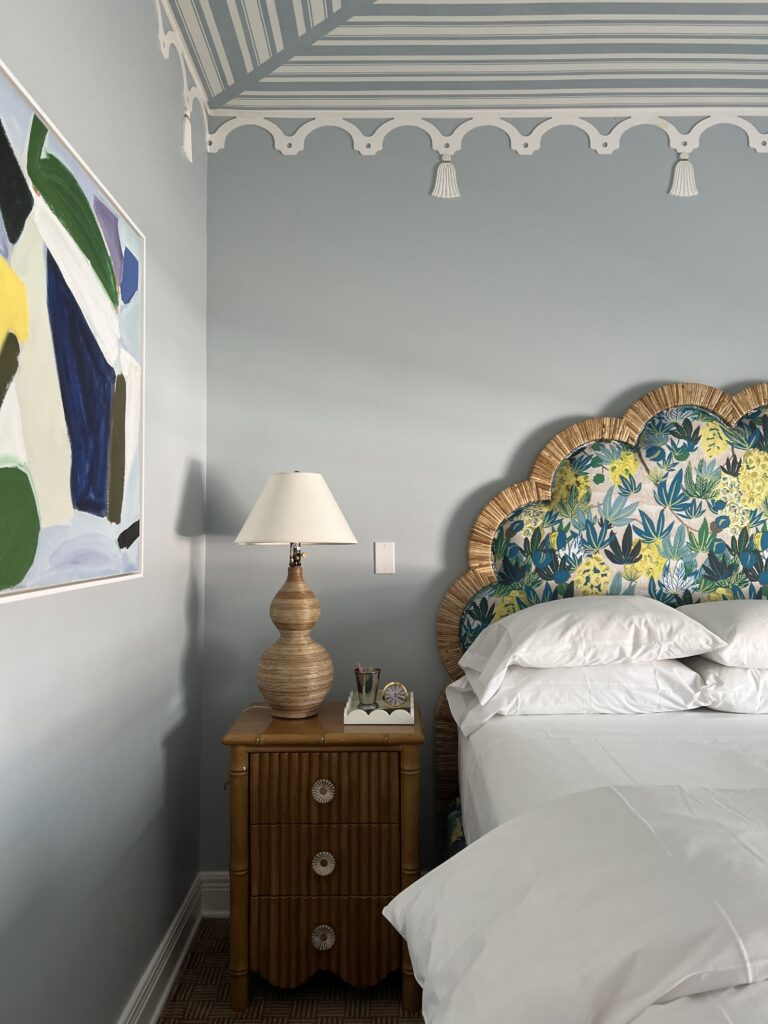
The Colony Hotel – where every inch of this iconic pink haven unfolds like a timeless design masterpiece, and let me tell you, it’s even more enchanting than I imagined. The stroll up from Worth Avenue is like entering a fairy tale, with the pink and white facade setting the scene for the magic within.
Stepping into the foyer is like an interior designer’s dream come true – curves, ornate fireplaces, bespoke De gourney hand painted murals in whites, greens, and fresh pinks. It’s the epitome of Palm Beach style with a modern twist, a symphony of design perfection. I vividly recall the awe I felt, akin to that moment when I first stepped into the Beverly Hills Hotel – that “This is It” sensation hit me once again at The Colony. I just wanted to soak in every detail, touch every surface, and fully immerse myself in the atmosphere.
Now, let’s talk lunch at Swifty’s this is a Palm Beach institution it’s bright, classy, elegant and a must visit destination, I ordered a margarita at the bar before sitting down for lunch and met a couple and their poodles who were regulars and had been coming for the last twenty years to drink champagne at The Colony, how fabulous. I’m hoping that will be me one day!
Some of the recently made-over bedrooms are a breath of fresh air, pretty, and just downright fun, But the cherry on top for me is the penthouse bedroom suites crafted by the legendary designer Dorothy Draper. It’s not just a stay; it’s a visual feast of design excellence.
Dorothy Draper style
Dorothy draper is my interior design idol, she was a trailblazing interior designer, and is renowned for her bold and distinctive style that defined mid-20th-century American glamour. Her aesthetic, characterised by vibrant colours, oversized prints, and a fearless mix of patterns, has left a impactful mark on the world of interior design. Among the iconic hotels she has designed, The Colony Palm Beach stands as a testament to her enduring influence. Draper transformed this Palm Beach landmark into a masterpiece of Floridian elegance, infusing it with her signature use of bold hues and dramatic patterns.
As a pioneer in her field, Dorothy Draper’s legacy endures through her innovative designs, with The Colony Palm Beach standing as a living testament to her extraordinary talent and influence in shaping the visual landscape of luxury hospitality.
See you on the beach.
And there you have it, folks! Siobhan Murphy’s whirlwind tour of Palm Beach is like stepping into a pink-hued wonderland where every corner whispers elegance and every detail oozes sophistication. Whether you’re craving the next trendy destination or itching to elevate your interiors with a touch of Palm Beach flair, we’ve got you covered.
Grab your sunnies, pack your bags, and let House of Coco be your ultimate guide to all things chic and fabulous.



